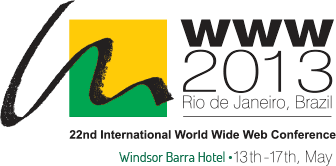Many of the workshops in WWW2013 deal with an issue that promises to be “trendy” for studies of the internet in the coming months and years: the relationship of data (“big data”) and social networks. One new development that promises to be a hot topic is the new Facebook tool, Facebook Graph Search, which will allow us to browse their huge database of social network users, finding people, photos, places and interests through their connections and preferences shared on the site.
Facebook Graph Search Video Presentation:
One of the WWW workshops on the subject is “Multidisciplinary Approaches to Big Social Data Analysis (MABSDA)“, organized by Professors Erik Cambria (National University of Singapore), Yunqing Xia, Tsinghua University (China) and Newton Howard, MIT Media Laboratory (USA). The workshop aims to explore the new frontiers of big data computing for opinion mining in order to more efficiently retrieve and extract social information from the web. Bebo White, a Departmental Associate (Retired) at the Stanford Linear Accelerator Center (SLAC), the high-energy physics and basic energy science laboratory operated by Stanford University, is the invited speaker at the workshop.
WWW MABSDA Programm
- The Web as a Laboratory (Bebo White)
- Like Prediction: Modeling Like Counts by Bridging Facebook Pages with Linked Data (Shohei Ohsawa)
- Tower of Babel: A Crowdgame Building Sentiment Lexicons for Resource-Scarce Languages(Yoonsung Hong)
- Rule-based Opinion Target and Aspect Extraction to Acquire Affective Knowledge (Stefan Gindl)
- A Graph-Based Approach to Common-Sense Concept Extraction and Semantic Similarity Detection (Dheeraj Rajagopal)
- Spanish Knowledge Base Generation for Polarity Classification from Masses (Arturo Montejo-Ráez)
- Revised Mutual Information Approach for German Text Sentiment Classification (Farag Saad)
More informations about the WWW MABSDA Workshop: http://sentic.net/mabsda/
The combination of data and social networks to search for user trends such as that proposed in the workshop promises put the idea of the “social web”, which has been discussed since at least 1996, back on the agenda. It was then that Howard Rheingold coined the term in an article for Time Magazine. Time was quoting from Rheingold’s website ”Electric Minds,” where he said that “‘The idea is that we will lead the transformation of the Web into a social Web”. Today, the popularity of social networking has made online social interaction common. The challenge is to further understand how the data exchanged by users in social networks can be used to understand the world today.
“The opportunity to capture the opinions of the general public about social events, political movements, company strategies, marketing campaigns, and product preferences has raised growing interest both within the scientific community, leading to many exciting open challenges, as well as in the business world, due to the remarkable benefits to be had from marketing and financial market prediction”, explains the WWW MABSDA organizers in the workshop webpage.
A science of the web
One way to go beyond studies of the social web is called “web science” – which, in summary, we can explain as an interdisciplinary approach that wants to study the web as the living organism that it is. As the article called “A Manifesto for Web Science?” explains, despite the huge effect that the web has had on computing – not to mention the world – computer scientists rarely study the web as a subject in its own right. Web Science aims to redress this: to build a platform where the web can be ‘… studied and understood as a phenomenon and also something to be engineered for future growth and capabilities’.
Web science conceives the web as a phenomenon constructed by society, by the activity of individuals who create interlinked content that both reflects and reinforces the interconnection of society and social interaction. This presentation called “How can we STUDY the Social Web?: The Web Science“, by Lora Aroyo from University of Amsterdam, says that web science wants to improve social web tools (constituted by algorithms) using socio-cultural data. “How can we extend current web infrastructure with mechanisms that make the social properties of information-sharing explicit and conform to relevant social-policy expectations?”, she questions.
The challenge of web science is to empower the creation and understanding of tools that propose more and better forms of social interaction – something that will become possible with the combination of big data and social networks. Some may ask: what about privacy? What about copyright? These are two of several controversial issues surrounding the subject, and that will be the subject of upcoming posts here.




















